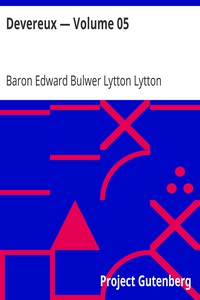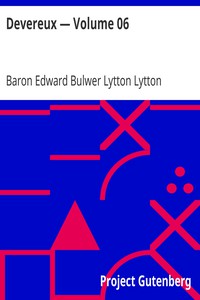Devereux — Volume 05 by Baron Edward Bulwer Lytton Lytton (ink ebook reader .txt) 📖

Book online «Devereux — Volume 05 by Baron Edward Bulwer Lytton Lytton (ink ebook reader .txt) 📖». Author Baron Edward Bulwer Lytton Lytton
Bezoni left me, unconscious of the anguish he bequeathed me, to think over all he had said. I did not sleep nor even retire to bed. I laid my head upon my hands, and surrendered myself to turbulent yet intense reflection. Every man who has lived much in the world, and conversed with its various tribes, has, I fear, met with many who, on this momentous subject, profess the same tenets as Bezoni. But he was the first person I had met of that sect who had evidently thought long and deeply upon the creed he had embraced. He was not a voluptuary nor a boaster nor a wit. He had not been misled by the delusions either of vanity or of the senses. He was a man pure, innocent, modest, full of all tender charities and meek dispositions towards mankind: it was evidently his interest to believe in a future state; he could have had nothing to fear from it. Not a single passion did he cherish which the laws of another world would have condemned. Add to this, what I have observed before, that he was not a man fond of the display of intellect, nor one that brought to the discussions of wisdom the artillery of wit. He was grave, humble, and self-diffident, beyond all beings. I would have given a kingdom to have found something in the advocate by which I could have condemned the cause: I could not, and I was wretched.
I spent the whole of the next week among my books. I ransacked whatever in my scanty library the theologians had written or the philosophers had bequeathed upon that mighty secret. I arranged their arguments in my mind. I armed myself with their weapons. I felt my heart spring joyously within me as I felt the strength I had acquired, and I sent to the philosopher to visit me, that I might conquer and confute him. He came; but he spoke with pain and reluctance. He saw that I had taken the matter far more deeply to heart than he could have supposed it possible in a courtier and a man of fortune and the world. Little did he know of me or my secret soul. I broke down his reserve at last. I unrolled my arguments. I answered his, and we spent the whole night in controversy. He left me, and I was more bewildered than ever.
To speak truth, he had devoted years to the subject: I had devoted only a week. He had come to his conclusions step by step; he had reached the great ultimatum with slowness, with care, and, he confessed, with anguish and with reluctance. What a match was I, who brought a hasty temper, and a limited reflection on that subject to a reasoner like this? His candour staggered and chilled me even more than his logic. Arguments that occurred not to me, upon my side of the question, /he/ stated at length and with force; I heard, and, till he replied to them, I deemed they were unanswerable: the reply came, and I had no counter-word. A meeting of this nature was often repeated; and when he left me, tears crept into my wild eyes, my heart melted within me, and I wept!
I must now enter more precisely than I have yet done into my state of mind upon religious matters at the time this dispute with the Italian occurred. To speak candidly, I had been far less shocked with his opposition to me upon matters of doctrinal faith than with that upon matters of abstract reasoning. Bred a Roman Catholic, though pride, consistency, custom, made me externally adhere to the Papal Church, I inly perceived its errors and smiled at its superstitions. And in the busy world, where so little but present objects or /human/ anticipations of the future engross the attention, I had never given the subject that consideration which would have enabled me (as it has since) to separate the dogmas of the priest from the precepts of the Saviour, and thus confirmed my belief as the Christian by the very means which would have loosened it as the Sectarian. So that at the time Bezoni knew me a certain indifference to—perhaps arising from an ignorance of—doctrinal points, rendered me little hurt by arguments against opinions which I embraced indeed, but with a lukewarm and imperfect affection. But it was far otherwise upon abstract points of reasoning, far otherwise, when the hope of surviving this frail and most unhallowed being was to be destroyed: I might have been indifferent to cavil upon /what/ was the word of God, but never to question of the justice of God Himself. In the whole world there was not a more ardent believer in our imperishable nature, nor one more deeply interested in the belief. Do not let it be supposed that because I have not often recurred to Isora's death (or because I have continued my history in a jesting and light tone) that that event ever passed from the memory which it had turned to bitterness and gall. Never in the masses of intrigue, in the festivals of pleasure, in the tumults of ambition, in the blaze of a licentious court, or by the rude tents of a barbarous host,—never, my buried love, had I forgotten thee! That remembrance, had no other cause existed, would have led me to God. Every night, in whatever toils or whatever objects, whatever failures or triumphs, the day had been consumed; every night before I laid my head upon my widowed and lonely pillow,—I had knelt down and lifted my heart to Heaven, blending the hopes of that Heaven with the memory and the vision of Isora. Prayer had seemed to me a commune not only with the living God, but with the dead by whom His dwelling is surrounded. Pleasant and soft was it to turn to one thought, to which all the holiest portions of my nature clung between the wearying acts of this hard and harsh drama of existence. Even the bitterness of Isora's early and unavenged death passed away when I thought of the heaven to which she was gone, and in which, though I journeyed now through sin and travail and recked little if the paths of others differed from my own, I yet trusted with a solemn trust that I should meet her at last. There was I to merit her with a love as undying, and at length as pure, as her own. It was this that at the stated hour in which, after my prayer for our reunion, I surrendered my spirit to the bright and wild visions of her far, but /not impassable/ home,—it was this which for that single hour made all around me a paradise of delighted thoughts! It was not the little earth, nor the cold sky, nor the changing wave, nor the perishable turf,—no, nor the dead wall and the narrow chamber,—which were around me then! No dreamer ever was so far from the localities of flesh and life as I was in that enchanted hour: a light seemed to settle upon all things around me; her voice murmured on my ear, her kisses melted on my brow; I shut my eyes, and I fancied that I beheld her.
Wherefore was this comfort? Whence came the spell which admitted me to this fairy land? What was the source of the hope and the rapture and the delusion? Was it not the deep certainty that /Isora yet existed/; that her spirit, her nature, her love were preserved, were inviolate, were the same? That they watched over me yet, that she knew that in that hour I was with her, that she felt my prayer, that even then she anticipated the moment when my soul should burst the human prison-house and be once more blended with her own?
What! and was this to be no more? Were those mystic and sweet revealings to be mute to me forever? Were my thoughts of Isora to be henceforth bounded to the charnel-house and the worm? Was she indeed /no more/? /No more/, oh, intolerable despair! Why, there was not a thing I had once known, not a dog that I had caressed, not a book that I had read, which I could know that I should see /no more/, and, knowing, not feel something of regret. No more! were we, indeed, parted forever and forever? Had she gone in her young years, with her warm affections, her new hopes, all green and unwithered at her heart, at once into dust, stillness, ice? And had I known her only for one year, one little year, to see her torn from me by a violent and bloody death, and to be left a mourner in this vast and eternal charnel, without a solitary consolation or a gleam of hope? Was the earth to be henceforth a mere mass conjured from the bones and fattened by the clay of our dead sires? Were the stars and the moon to be mere atoms and specks of a chill light, no longer worlds, which the ardent spirit might hereafter reach and be fitted to enjoy? Was the heaven—the tender, blue, loving heaven, in whose far regions I had dreamed was Isora's home, and had, therefore, grown better and happier when I gazed upon it—to be nothing but cloud and air? and had the love which had seemed so immortal, and so springing from that which had not blent itself with mortality, been but a gross lamp fed only by the properties of a brute nature, and placed in a dark cell of clay, to glimmer, to burn, and to expire with the frail walls which it had illumined? Dust, death, worms,—were these the heritage of love and hope, of thought, of passion, of all that breathed and kindled and exalted and /created/ within?
Could I contemplate this idea; could I believe it possible? /I could not/. But against the abstract, the logical arguments for this idea, had I a reply? I shudder as I write that at that time I had not! I endeavoured to fix my whole thoughts to the study of those subtle reasonings which I had hitherto so imperfectly conned: but my mind was jarring, irresolute, bewildered, confused; my stake seemed too vast to allow me coolness for the game.
Whoever has had cause for some refined and deep study in the midst of the noisy and loud world may perhaps readily comprehend that feeling which now possessed me; a feeling that it was utterly impossible to abstract and concentrate one's thoughts, while at the mercy of every intruder, and fevered and fretful by every disturbance. Men early and long accustomed to mingle such reflections with the avocations of courts and cities have grown callous to these interruptions, and it has been in the very heart of the multitude that the profoundest speculations have been cherished and produced; but I was not of this mould. The world, which before had been distasteful, now grew insufferable; I longed for some seclusion, some utter solitude, some quiet and unpenetrated nook, that I might give my undivided mind to the knowledge of these things, and build the tower of divine reasonings by which I might ascend to heaven. It was at this time, and in the midst of my fiercest internal conflict, that
 Have you ever thought about what fiction is? Probably, such a question may seem surprising: and so everything is clear. Every person throughout his life has to repeatedly create the works he needs for specific purposes - statements, autobiographies, dictations - using not gypsum or clay, not musical notes, not paints, but just a word. At the same time, almost every person will be very surprised if he is told that he thereby created a work of fiction, which is very different from visual art, music and sculpture making. However, everyone understands that a student's essay or dictation is fundamentally different from novels, short stories, news that are created by professional writers. In the works of professionals there is the most important difference - excogitation. But, oddly enough, in a school literature course, you don’t realize the full power of fiction. So using our website in your free time discover fiction for yourself.
Have you ever thought about what fiction is? Probably, such a question may seem surprising: and so everything is clear. Every person throughout his life has to repeatedly create the works he needs for specific purposes - statements, autobiographies, dictations - using not gypsum or clay, not musical notes, not paints, but just a word. At the same time, almost every person will be very surprised if he is told that he thereby created a work of fiction, which is very different from visual art, music and sculpture making. However, everyone understands that a student's essay or dictation is fundamentally different from novels, short stories, news that are created by professional writers. In the works of professionals there is the most important difference - excogitation. But, oddly enough, in a school literature course, you don’t realize the full power of fiction. So using our website in your free time discover fiction for yourself. 




Comments (0)